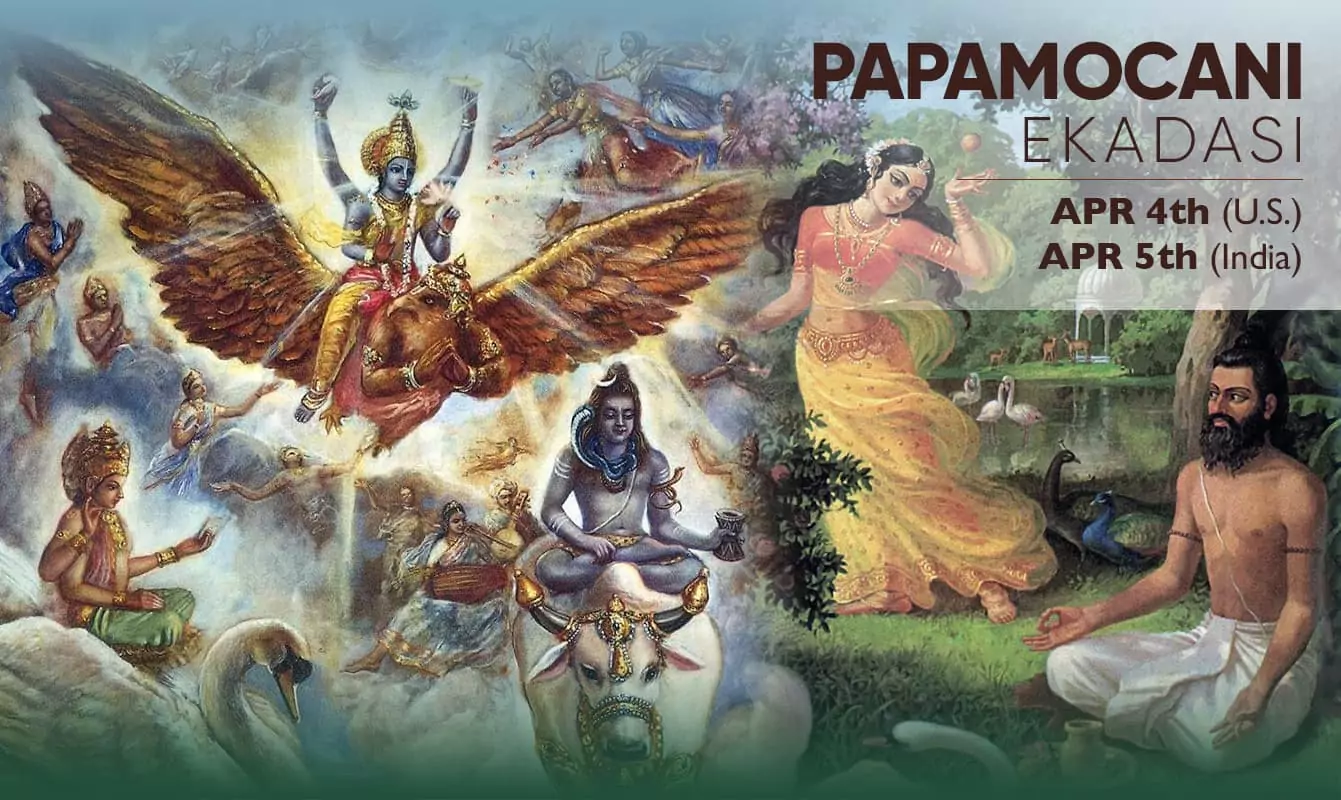Papamocani Ekadasi falls on the 11th day of the Krishna Paksha (the waning phase of moon) in the month of Chaitra as per the North Indian calendar. However, in the South Indian calendar this Ekadasi is observed in the Vedic month of Phalgun. In the English calendar this corresponds to the months of March to April. Papamocani Ekadasi is the last Ekadasi observance of the 24 Ekadasis in the Vedic calendar. It falls between the celebrations of Holika Dahan and Chaitra Navratri.
This is an auspicious time to contribute financially towards the completion of the Nrsimhadeva Temple in the TOVP, by Nrsimha Caturdasi, May, 2024. There are many different types of sponsorships available and most are pledges which can be paid over several months or years. Visit the Give To Nrsimha Fundraiser page for more information.
NOTE: Papamocani Ekadasi is observed on April 4 in most of the U.S and April 5 in India. Please refer to your local calendar through www.vaisnavacalendar.info.
View, download and share the TOVP 2024 Calendar.
The Glories of Papamocani Ekadasi
From the Bhavisyottara Purana
The venerable glories of Papamocani Ekadasi are given in the Bhavisyottara Purana, during a conversation between Sri Krsna and Maharaja Yudhisthira.
The eldest of the Pandavas, Yudhisthira, asked Lord Krsna. “O Lord, You have kindly narrated the glories of Amalaki Ekadasi. Now please describe unto me the details of the Ekadasi which occurs during the waning Moon in the Chaitra month (March/April) What is this Ekadasi called, and what is the procedure for observing it?”
Lord Krsna replied: “O unrivalled King, this Ekadasi is known as Papamocani, please listen carefully as I describe its glories unto you. In the dim recesses of the misty past this Ekadasi was discussed between the Sage Lomasa and King Mandata. This Papamocani Ekadasi falls during the waning Moon in the month of Chaitra. By carefully observing this Ekadasi day all one’s sinful reactions will be nullified, one need never fear taking birth as a ghost; it can also award eight kinds of mystic perfection.
“The great sage known as Lomasa said to King Mandata: ‘In an ancient time, Kuvera, the treasurer of the demigods, boasted a heavenly forest known as Caitraratha. The weather was always pleasant there, and exhibited an eternal springtime atmosphere. Many heavenly society girls such as the Gandharva’s and Kinnaras would come to that celestial forest to enjoy sporting in its blissful surroundings. King Indra and many other demigods would also come there to enjoy many varieties of exchanges.
‘There was also a sage known as Medhavi residing in the forest. He was a staunch devotee of Shiva and was engaged in performing great austerities. The Apsaras, or heavenly dancing girls tried to disturb the sage in various ways. Of all the Apsaras one was most celebrated and famous. Her name was Manju Ghosh and she devised a cunning plan to captivate the mind of the sagacious saint. She built a house situated just near to the sage’s ashrama and began to sing sweetly whilst playing enchanting melodies on a Vina. Upon witnessing Manju Ghosh’s salubrious beauty, adorned as she was with sandalwood pulp, fragrant garlands and divine ornaments, Cupid, who is the forsworn enemy of Lord Shiva, tried to conquer the sage by way of revenge against Lord Shiva. Cupid had once been burnt to ashes by Lord Shiva and thus remembering this previous insult conspired to humiliate Shiva’s devotee.
‘He entered the body of the sage Medhavi just as Manju Ghosh approached him playing on her vina, singing sweetly and casting seductively arrowed glances from the quiver of her eyes. The sage Medhavi became intoxicated with desire and enjoyed with the beautiful Apsara for many years. So absorbed he was in enjoying in this way he lost all sense of time, even the ability to discriminate between day and night.
‘Henceforth, when Manju Ghosh grew tired of the sage Medhavi, she decided to return to her own abode. She said to Medhavi, “O great sage, please allow me to return to my home in the heavenly planets.”
‘The sage replied: “O beauty incarnate, you have only arrived here in the evening, at least stay until morning and then depart.” Upon hearing these words Manju Ghosh became frightened and stayed with Medhavi for a few more years. In this way although she stayed with the sage for fifty-seven years, nine months and three days, it still only appeared to the sage to be half a night. Manju Ghosh asked again for permission to leave but the sage replied, “O attractive one, this is only morning, please wait until I have completed my morning rituals.” The beautiful Apsara then smiled and said, “O great sage, how long will your rituals take? Have you still not finished yet? You have been enjoying with me for many years, please consider the actual value of time.”
On hearing these words, the sage came to his senses and realized the length of time that had passed. “Alas, O beautiful lady, I have simply wasted fifty-seven years of my valuable time. You have ruined my life, spoiled all of my austerities and condemned me to madness!” The eyes of the sage Medhavi filled with tears and his body convulsed as he cried. Raising his head, his eyes turned red with anger, and in a fearsome voice he cursed Manju Ghosh with the following words, “O evil one, you have behaved with me exactly like a witch. Therefore you will immediately become a witch, O sinful unchaste Lady! Shame on you.”
‘After being cursed by the sage, Manju Ghosh humbly replied, “O best of the brahmanas! Please withdraw your heavy curse, I have spent many years in your company, bringing you pleasure beyond your wildest dreams! Surely for this reason you can forgive me. Please be kind to me.”
‘The sage replied, “O gentle one, what will I do now? You have destroyed my wealth of austerity. Still, I will give you a chance to free yourself from this curse. The Ekadasi that falls during the waning Moon of the Chaitra month is called Papamocani. If you observe this Ekadasi very strictly, all your sinful reactions will be destroyed and you will be free of this crippling curse.”
‘After speaking these words, Medhavi returned to the ashrama of his father, Cyavana Rsi. As soon as Cyavana Rsi saw his pathetic son he became extremely disappointed. He said, “Alas, alas my son, O what have you done? You are ruined and should not have spoiled yourself in this way.”
‘The young sage Medhavi replied, “O father, I have committed great sins in the company of a beautiful Apsara, please instruct me how I can be freed from the sinful reactions.”
‘Cyavana Rsi replied, “O my son, there is an Ekadasi that falls on the waning Moon of the month of Chaitra. This Ekadasi will destroy all your sinful reactions. Therefore, you should follow this Ekadasi, but you should know that I am most disappointed in you!”
‘Thereafter, the sage Medhavi observed Papamocani Ekadasi and regained his elevated status as a sage of great repute. At the same time Manju Ghosh carefully observed Papamocani Ekadasi and got liberated from her accursed form, regained her bodily attractiveness and returned to the heavenly strata.’
“After narrating this story to King Mandata, sage Lomasa concluded as follows: ‘My dear King, anyone who observes this Ekadasi will have all his sinful reactions annihilated.’
Sri Krsna concluded, “O King Yudhisthira, whoever reads or hears about Papamocani ekadasi obtains the very same merit he would get if he donated a thousand cows in charity, and he also nullifies the sinful reactions he may have incurred by killing a brahmana, killing an embryo through abortion, drinking liquor, or having sex with his guru’s wife. Such is the incalculable benefit of properly observing this holy day of Papamocani Ekadasi, which is so dear to Me and so meritorious.”
Thus ends the narration of the glories of Papamocani Ekadasi from the Bhavisyottara Purana.
This article has been used courtesy of ISKCON Desire Tree
TOVP NEWS AND UPDATES – STAY IN TOUCH
Visit: www.tovp.org
Support: https://tovp.org/donate/seva-opportunities
Email: tovpinfo@gmail.com
Facebook: www.facebook.com/tovp.mayapur
YouTube: www.youtube.com/user/tovpinfo
Twitter: https://twitter.com/TOVP2022
Telegram: https://t.me/TOVP_GRAM
WhatsApp: https://m.tovp.org/whatsappcommunity1
Instagram: https://m.tovp.org/tovpinstagram
App: https://m.tovp.org/app
News & Texts: https://m.tovp.org/newstexts
RSS News Feed: https://tovp.org/rss2/
Store: https://tovp.org/tovp-gift-store/


